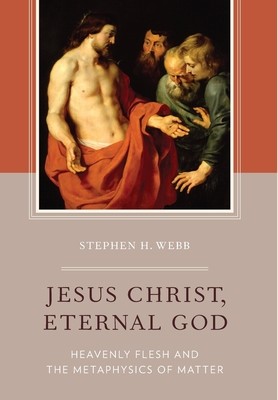
- We will send in 10–14 business days.
- Author: Stephen H Webb
- Publisher: Oxford University Press, USA
- Pages: 368
- ISBN-10: 0199827958
- ISBN-13: 9780199827954
- Format: 16.5 x 23.6 x 3.1 cm, kieti viršeliai
- Language: English
- SAVE -10% with code: EXTRA
Reviews
Description
In this groundbreaking study, Stephen H. Webb offers a new theological understanding of the material and spiritual: that, far from being contradictory, they unite in the very stuff of the eternal Jesus Christ.
Accepting matter as a perfection (or predicate) of the divine requires a rethinking of the immateriality of God, the doctrine of creation out of nothing, the Chalcedonian formula of the person of Christ, and the analogical nature of religious language. It also requires a careful reconsideration of Augustine's appropriation of the Neo-Platonic understanding of divine incorporeality as well as Origen's rejection of anthropomorphism. Webb locates his position in contrast to evolutionary theories of emergent materialism and the popular idea that the world is God's body. He draws on a little known theological position known as the ''heavenly flesh'' Christology, investigates the many misunderstandings of its origins and relation to the Monophysite movement, and supplements it with retrievals of Duns Scotus, Caspar Scwenckfeld and Eastern Orthodox reflections on the transfiguration. Also included in Webb's study are discussions of classical figures like Barth and Aquinas as well as morerecent theological proposals from Bruce McCormack, David Hart, and Colin Gunton. Perhaps most provocatively, the book argues that Mormonism provides the most challenging, urgent, and potentially rewarding source for metaphysical renewal today. Webb's concept of Christian materialism challenges traditional Christian common sense, and aims to show the way to a more metaphysically sound orthodoxy.
EXTRA 10 % discount with code: EXTRA
The promotion ends in 22d.03:10:21
The discount code is valid when purchasing from 10 €. Discounts do not stack.
- Author: Stephen H Webb
- Publisher: Oxford University Press, USA
- Pages: 368
- ISBN-10: 0199827958
- ISBN-13: 9780199827954
- Format: 16.5 x 23.6 x 3.1 cm, kieti viršeliai
- Language: English English
In this groundbreaking study, Stephen H. Webb offers a new theological understanding of the material and spiritual: that, far from being contradictory, they unite in the very stuff of the eternal Jesus Christ.
Accepting matter as a perfection (or predicate) of the divine requires a rethinking of the immateriality of God, the doctrine of creation out of nothing, the Chalcedonian formula of the person of Christ, and the analogical nature of religious language. It also requires a careful reconsideration of Augustine's appropriation of the Neo-Platonic understanding of divine incorporeality as well as Origen's rejection of anthropomorphism. Webb locates his position in contrast to evolutionary theories of emergent materialism and the popular idea that the world is God's body. He draws on a little known theological position known as the ''heavenly flesh'' Christology, investigates the many misunderstandings of its origins and relation to the Monophysite movement, and supplements it with retrievals of Duns Scotus, Caspar Scwenckfeld and Eastern Orthodox reflections on the transfiguration. Also included in Webb's study are discussions of classical figures like Barth and Aquinas as well as morerecent theological proposals from Bruce McCormack, David Hart, and Colin Gunton. Perhaps most provocatively, the book argues that Mormonism provides the most challenging, urgent, and potentially rewarding source for metaphysical renewal today. Webb's concept of Christian materialism challenges traditional Christian common sense, and aims to show the way to a more metaphysically sound orthodoxy.


Reviews